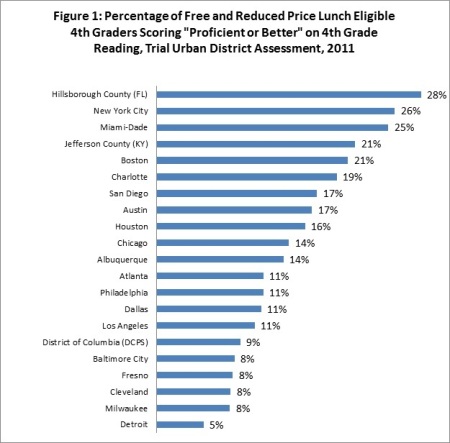
(Guest Post by Matthew Ladner)
I had the opportunity to discuss A-F school grading with a thoughtful skeptic yesterday. Sadly my doubting Thomas remained a skeptic at the end of our discussion. I showed him data about the trend for improving grades in Florida, and he produced data to show improving fuzzy labels from his state. I told him that Florida’s progress is confirmed by improving NAEP data, whereas his state has flatlined on NAEP over the last decade despite improved state scores. He wasn’t buying it.
My failure to persuade however got me to thinking about the Trial Urban District Assessment NAEP data. I ran the proficiency numbers for free and reduced lunch eligible students in all the districts and found the following for 4th grade reading:
 Note that the top 3 performers all operate under an A-F school grading system Hillsborough (Tampa), Miami-Dade and New York City (NYC has operated under A-F longer than any non-Florida district). Obviously there are plenty of other factors at play than school grading, but note that a poor child in Tampa is almost six times more likely to be reading at a proficient level than a poor child in Detroit.
Note that the top 3 performers all operate under an A-F school grading system Hillsborough (Tampa), Miami-Dade and New York City (NYC has operated under A-F longer than any non-Florida district). Obviously there are plenty of other factors at play than school grading, but note that a poor child in Tampa is almost six times more likely to be reading at a proficient level than a poor child in Detroit.
So I decided to run the numbers for 8th grade reading, and found the same basic result, with the same top 3 districts, just in a slightly different order. Top performers NYC and Miami have 8th grade students more than three times more likely to read proficiently than students in the lowest performer (again Detroit).
Why do the A-F districts top the list? A 2007 study by the Urban Institute is quite suggestive:
We analyze the impact of the accountability system on Florida’s students and schools using a three-part analysis. First, we estimate the effect of the accountability system and the threat of becoming voucher eligible on student test score performance, both in the short-run and in the longer term. Second, we study the effects of the reform on school policies and practices. Finally, we attempt to determine if the policies appear to affect student achievement or explain the change in student performance. We find that student achievement significantly increased in elementary schools that received an “F” grade by between 6 to 14 percent of a standard deviation in math and between 6 to 10 percent of a standard deviation in reading in the first year. Three years later the impacts persist.
Importantly, we also detect specific school policy changes implemented by the schools that explain part of these increases. Specifically, when faced with increased accountability pressure, schools appear to focus on low-performing students, lengthen the amount of time devoted to instruction, adopt different ways of organizing the day and learning environment of the students and teachers, increase resources available to teachers, and decrease principal control. These, combined with other policies, explain more than 15 percent of the test scores gains of students in reading and over 38 percent of the test scores gains of students in math, depending on the model specification. As such we find evidence that schools respond to accountability pressure in educationally meaningful ways.
So if the powers that be mandated that you were going to come back as an urban poor child, would you want to take your chances in Miami Dade or Dallas or Detroit?
Me too- and school grading is a part of the reason why.


Things don’t look so great here:
http://jerseyjazzman.blogspot.com/2013/05/think-tanky-thinking.html